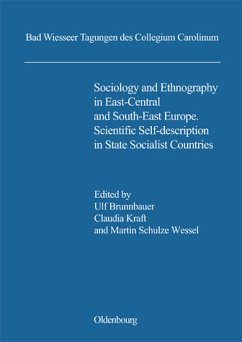Der Alltag in kommunistischen Regimen galt lange als ein gut gehütetes Geheimnis. Die Alltagsgeschichte ist unterdessen in den Blick der Forschung geraten, nicht aber die Wissenschaften, die sich mit "realem Leben" beschäftigen: Ethnologie und Soziologie.
Everyday life was once considered to be one of the best hidden secrets of communist regimes. Despite the recent surge in the history of everyday life under state socialism, there is still little research on the development of those disciplines which analysed and described "real life" from within communist Eastern Europe. The present volume seeks to fill this gap. In contributions which examine the history of ethnography and sociology under state socialism, it asks which scholarly self-descriptions socialist societies produced. The authors of the volume discuss the complex relationship between the party-state and academic ethnography and sociology. They analyse the impact of ideology and politics on both disciplines and trace the development of their main research paradigms. While describing the limitations of ethnography and sociology, which were mainly due to political constraints, the authors also highlight the achievements of both disciplines and show how their research findings reveal a significant gap between ideology and "reality". These findings offer a valuable basis for a critical historical approach in current research on everyday life under state socialism.
Ulf Brunnbauer, geboren 1970, ist Professor für Geschichte Südost- und Osteuropas an der Universität Regensburg und Direktor des Südost-Instituts.
Everyday life was once considered to be one of the best hidden secrets of communist regimes. Despite the recent surge in the history of everyday life under state socialism, there is still little research on the development of those disciplines which analysed and described "real life" from within communist Eastern Europe. The present volume seeks to fill this gap. In contributions which examine the history of ethnography and sociology under state socialism, it asks which scholarly self-descriptions socialist societies produced. The authors of the volume discuss the complex relationship between the party-state and academic ethnography and sociology. They analyse the impact of ideology and politics on both disciplines and trace the development of their main research paradigms. While describing the limitations of ethnography and sociology, which were mainly due to political constraints, the authors also highlight the achievements of both disciplines and show how their research findings reveal a significant gap between ideology and "reality". These findings offer a valuable basis for a critical historical approach in current research on everyday life under state socialism.
Ulf Brunnbauer, geboren 1970, ist Professor für Geschichte Südost- und Osteuropas an der Universität Regensburg und Direktor des Südost-Instituts.

